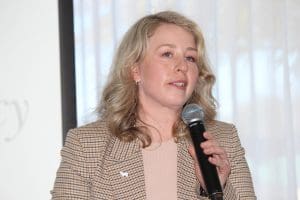Advocacy in Agriculture: A Call for Strategic Thinking
At the Victorian Farmers Federation 2025 Livestock Conference in Bendigo, outgoing Cattle Australia CEO Dr. Chris Parker emphasized the need for a more refined and proactive approach to agricultural advocacy. Speaking on an agricultural policy panel, he urged the industry to seize the opportunity for long-term influence under the Albanese Government.
Dr. Parker articulated that “disunity is death” when it comes to governmental action on agricultural concerns. He acknowledged the critical need for the agricultural sector to present a united front to effectively engage with policymakers.
The Importance of Effective Advocacy
Panel chair Bonnie Skinner, CEO of Sheep Producers Australia, highlighted that the industry must continually ask itself, “What is effective advocacy?” She questioned whether the producer sector is too reactive and pondered how to stay ahead of policy rather than chasing it. Dr. Parker echoed her sentiments, noting that throughout his career, he has observed a tendency for the agricultural industry to be more reactive and less strategic in its advocacy efforts.
“Agriculture, particularly my time in government, has become less sophisticated about advocacy, which presents a real challenge,” Dr. Parker asserted. He urged the sector to rethink how it engages with the government, emphasizing that with a stable federal government for the next nine years, a significant opportunity exists for agriculture to shape prolonged policies.
Navigating the Political Landscape
Dr. Parker elaborated on the arrogance sometimes displayed by a majority government but pointed out that such stability offers agriculture a chance to influence policy positively. “Our opponents are better resourced and more savvy,” he observed, urging the agricultural sector to enhance its policy advocacy skills.
“Farming remains the most trusted profession in the country,” added Dr. Parker, reinforcing the agricultural community’s ability to access ministers and make their voices heard. However, he cautioned that being reactive has hampered the industry’s effectiveness in the past.
Disunity: A Grave Concern
Reflecting on the dynamics in Canberra, Dr. Parker stated, “Disunity is death,” emphasizing the importance of a cohesive industry perspective on various issues. He recalled times when conflicting views within the farming community led to governmental inaction, noting that competing opinions weaken advocacy efforts.
He acknowledged the necessity to appeal to politicians’ desire to do good, urging industry representatives to present messages that resonate with broader social and economic goals, particularly under the current government’s priorities.
Challenges in Live Sheep Export Advocacy
 Skinner shared insights from her advocacy experiences, especially regarding the phaseout of live sheep exports. She emphasized that merely citing animal welfare outcomes failed to resonate with policymakers; instead, economic arguments proved more persuasive, highlighting the competitive stakes for WA producers.
Skinner shared insights from her advocacy experiences, especially regarding the phaseout of live sheep exports. She emphasized that merely citing animal welfare outcomes failed to resonate with policymakers; instead, economic arguments proved more persuasive, highlighting the competitive stakes for WA producers.
“In 2025, if you’re not influencing public opinion, you’re not influencing policy,” Skinner warned. She reiterated that advocacy takes many forms, including strategy and relationship-building. “We need to ensure that producers and advocacy groups are at the table consistently, not just during crises,” she stated, underscoring the importance of ongoing dialogues to substantiate effective agricultural policies.
In conclusion, the conversations highlighted at the 2025 Livestock Conference reveal a shared understanding among agricultural leaders that the future of farming advocacy hinges on a united, strategic approach that leverages the industry’s strengths while addressing its weaknesses.
This structured article effectively summarizes the key points discussed at the conference while remaining organized and ready for WordPress integration.



